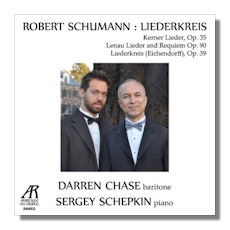
The Internet's Premier Classical Music Source
Related Links
- Schumann Reviews
- Latest Reviews
- More Reviews
-
By Composer
-
Collections
DVD & Blu-ray
Books
Concert Reviews
Articles/Interviews
Software
Audio
Search Amazon
Recommended Links
Site News
 CD Review
CD Review
Robert Schumann

Lieder
- Twelve Poems By Justinus Kerner, Op. 35
- Lust Der Sturmnacht
- Stirb,Lieb' und Freud'!
- Wanderlied
- Erstes Grün
- Sehnsucht nach der Waldgegend
- Auf das Trinkglas eines verstorbenen Freundes
- Wanderung
- Stille Liebe
- Frage
- Stille Tränen
- Wer machte dich so krank?
- Alte Laute
- Six Poems by Nikolaus Lenau and Requiem (Old Catholic Poem), Op. 90
- Lied eines Schmiedes
- Meine Rose
- Kommen und Scheiden
- Die Sennin
- Einsamkeit
- Der schwere Abend
- Requiem
- Liederkreis: Twelve Songs by Joseph von Eichendorff, Op. 39
- In der Fremde
- Intermezzo
- Waldesgespräch
- Die Stille
- Mondnacht
- Schöne Fremde
- Auf einer Burg
- In der Fremde
- Wehmut
- Zwielicht
- Im Walde
Darren Chase, baritone
Sergey Schepkin, piano
Arabesque Recordings Z6852 79m
Darren Chase, who appears to be still in his twenties if I can judge by the album cover photo, is a baritone who won the 2013 American Prize, Art Song Division. One or two references to him on the internet mention that he is a tenor. He made a recording of Debussy songs for Albany Records (which I have not heard) and on the cover he is listed as a tenor. On the operatic stage he has sung a number of tenor roles, including Des Grieux in Manon Lescaut, Pelleas in Pelleas et Melisande, Almaviva in The Barber of Seville, Ferrando in Cosi and others. Well, a high baritone can generally handle these roles, and that's what many might class Chase as. There's little doubt he has a chameleonic voice, but he is, if I can judge his work by this recording alone, quite at home in this Schumann repertory. His voice is rich and creamy, but divulges a brightness even in the lower ranges. He can reach the higher notes with seeming ease, and nothing here ever poses a challenge to his considerable vocal technique. Interpretively, he sings these cycles of Schumann lieder with complete mastery, conveying both a youthful energy in the brighter moods and a mature grasp of the more serious and darker music.
You generally would not expect a young singer to display such maturity in his interpretations, but Chase routinely does. Try the forlorn Stirb, Lieb' und Freud'!, from Op. 35, where he catches the sentimental and sad character of the piece while never sacrificing the lyrical beauty for exaggerated dramatics. In the ensuing Wanderlied Chase imparts such infectious energy to the outer sections but allows the music to yield to emotional misgivings in the middle section. In the next item, Erstes Grün he again conveys the emotional heart of the music, making you feel the pain and yearning in the poetry and in such ravishing tones. I could go on, taking each lied from Op. 35 in order, citing the singer's consistent artistry in every one, but let me cite just a few others: Auf das Trinkglas eines verstorbenen Freundes (#6) is a great success as are Stille Liebe (#8) and Stille Tränen (#10).
In the Op. 90 collection we're into late Schumann, but oddly the lieder length on the whole is considerably shorter though still imbued with both expressive depth and melodic distinction. Chase turns in a number of gems here too. Lied eines Schmiedes (#1) comes across with a perfect mixture of robustness and gentleness. Chase deftly captures the ambivalence of Die Sennin (#4), beginning with such youthful energy and innocence and then transforming ever so subtly to a sweetly contemplative and slightly foreboding character. The Requiem is also quite touching.
Of the three sets here, the Op. 39 Liederkreis cycle is the most heavily performed and recorded. It contains several Schumann lieder favorites, including the ever-popular Mondnacht (#5). Chase's account of it is splendid, nearly beyond any criticism, though I wish he had chosen a slightly faster tempo. Waldesgespräch (#3) is also quite excellent in its robustness and energy. So is the effervescent Schöne Fremde (#6). Wehmut (#9) is another success, though once again one might suggest the tempo could be a bit livelier. That said, the sense of passion and lyrical flow of the music, as well as the sadness expressed in the poem all come through convincingly here. By the way, the lovely theme in Wehmut (Melancholy) has taken on a second life, at least according to Prokofiev biographer Daniel Jaffe, who says Prokofiev alludes to it in the second movement of his Seventh Piano Sonata as a way to convey the message of sadness in life under Stalin. Considering the similarity of the themes and their sharing of the same key (E Major), I think Jaffe is on to something.
For reference' sake, I listened to various performances from these Schumann sets by Fischer-Dieskau, and not surprisingly, Chase compares quite favorably. This young singer is consistently insightful, subtle and vocally appealing throughout the disc. His accompanist, Sergey Schepkin, performs splendidly as well and the sound reproduction from Arabesque is clear and well balanced. I can only say that at 79:12 you certainly get your money's worth here. Actually, if you're hesitant about acquiring this disc you can get a good idea of whether you'll like it by visiting Youtube, where several live Schumann lieder performances by Chase and Schepkin are available. The CD comes in a cardboard sleeve, with no album notes or texts. Texts, I am told, are available for download at Arabesque Records' website. For lieder enthusiasts and those interested in hearing a sensational new vocal talent, this disc is a must. Strongly recommended!
Copyright © 2014, Robert Cummings












